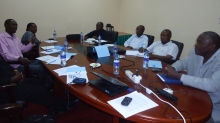Making use of the ‘new animal from the forest’: East African unions strengthen social dialogue mechanisms

A 3-year project that took place between 2010 and 2012 in East Africa called "Unions as partners in social dialogue in East Africa" has built trade union capacity so that unions become ‘influential tripartite partners contributing to a public sector that delivers affordable and quality public services for workers and society at large, in an environment where trade union rights are respected…’
In order to shape the direction of public sector reform, PSI’s affiliates in Kenya, Tanzania and Zanzibar and Uganda have been building their lobbying and advocacy skills and successfully pushing for the creation of new public sector negotiating machineries. They have also been busy paving the way to gain observer status at the East African Community which formulates national public sector restructuring and other social policies for the region.
In the past decade, nationally and regionally, Governments in Kenya, Tanzania and Uganda have been steadily eroding the quality of public services and introducing challenging new trade union laws.
Five years ago, describing social dialogue as ‘a new animal from the forest’, PSI’s affiliates focused too heavily on traditional union representation methods, they lacked lobbying and advocacy skills and did not always act in unity. Consequently, they were marginalised as stakeholders and were unable to counter balance neoliberal influences from the International Finance Institutions and the private sector. In 2008, they agreed to a cultural change in their approach to trade union work, unity and democracy.
“Since then, the unions have successfully built the lobbying and advocacy skills of their leaders, educators, branch officials, women and youth representatives. They have researched and adopted gender sensitive alternative public sector reform positions and have run Quality Public Services campaigns. In all three countries, advocacy for social dialogue mechanisms is really paying off,” explains Sani Baba, PSI Sub-Regional Secretary for English-speaking Africa.
For example, in Tanzania, the unions researched the health, water and energy needs of their membership and local communities and used the results to develop policies and campaigns. They then successfully lobbied the government for a Public Sector Negotiating Machinery and this came into operation late 2010.
Additionally, when the Tanzanian Government decentralised power to local government, many workers were initially retrenched or had their salaries cut. At this point, the effected unions could have spent energy in a damaging rift over membership demarcation. Instead, they utilised their social dialogue skills and experiences to resolve their problems and presented a unified position to government. The retrenched civil servants either got their jobs back or were given a redundancy package of 40 months salary. In 2012, the Tanzanian unions have also shared their experiences with their Kenyan sister unions who face a similar challenge due to changes in the Kenyan Constitution which has led to the devolving of power to 47 new Counties.
Finally, the project has assisted the unions to pave the way for gaining observer status at the East African Community (EAC), an increasingly important regional organisation driving economic and political integration in East Africa. This journey has included researching the EAC’s functioning, registering the Association of Public Sector Unions of East Africa (APSU-EA) in each country and setting up a staffed APSU-EA Office in the Tanzanian Government Workers Unions’ premises in Arusha, where the EAC itself is based. Sani explains further:
“Unions in Burundi and Rwanda, whose governments recently joined the EAC are also now locally registering APSU-EA. We are very hopeful that in early 2013, APSU-EA will gain observer status and the unions will finally be able to represent their members through social dialogue at the EAC.”
This PSI project “Unions as Partners in Social Dialogue: Regional East Africa” was supported by affiliates IMPACT (of Ireland) and Kommunal (of Sweden) in collaboration with LO-TCO Biståndsnämnd (the LO-TCO Secretariat for International Trade Union Development Co-operation).
For a complete survey of IMPACT/PSI trade union development cooperation between 2008 and 2013 click here: In the People's Interest
Map: IMPACT/PSI project collaboration between 2008 and 2013

